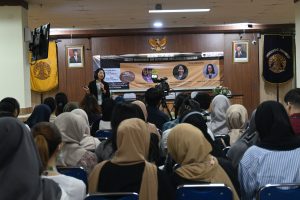
The Faculty of Public Health (FPH) Universitas Indonesia (UI) held SEMOL Series 9 which took place in the Doctoral Promotion Room, Building G FPH UI on Saturday, May 4, 2024. With the theme “Academic Exploration: Obesity Management and Nutritional Challenges in Malaysia”, this event presenting two expert speakers from Malaysia who discussed health issues related to obesity and nutrition. Assoc. Prof. Wong Jyh Eiin, Ph.D., from Universitas Kebangsaan Malaysia discussed obesity management in Malaysia, while Assoc. Prof. Dr. Geeta Appannah, M.Sc., from Putra University Malaysia discussed nutritional problems in the country. SEMOL Series 9 is required for all UI nutrition study program students to broaden their understanding of these important topics.
Through his remarks, Dr. Ir. Asih Setiarini, M.Sc. expressed concern regarding the Triple Burden of Malnutrition phenomenon that Indonesia is currently facing, referring to the conditions that occur, namely malnutrition, excess nutrition or overweight, and micronutrient deficiencies. The problems currently facing Indonesia also include the problem of nutritional deficiencies and the high prevalence of obesity in underage children.
“The high rate of obesity is very worrying because it can have a negative impact on the health of the younger generation and the welfare of the nation,” said Dr. Love. Addressing this problem, Dr. Asih highlighted the importance of learning from the Malaysian experience, in implementing effective obesity prevention strategies.

Assoc. Prof. Wong Jyh Eiin, Ph.D., explains the various opportunities and challenges of obesity management in Malaysia. Outlining the approaches that have been taken and the strategies that are being developed, Assoc. Prof. Wong Jyh Eiin provides insight into the efforts being made in Malaysia to tackle the obesity problem. In fact, Malaysia is also experiencing rapid changes in nutritional patterns due to environmental and lifestyle changes. This causes complex nutritional problems to be experienced, such as malnutrition (stunting and wasting), micronutrient deficiencies, and excess nutrition (overweight and obesity). To overcome this problem, a comprehensive approach is needed that considers various environmental factors and individual behavior.

Implementation of nutrition policy involves several important sectors and steps. “First, we are trying to establish a Healthy Central Kitchen at Kyushoku Center. “Furthermore, there are efforts to limit television advertising for foods/drinks high in fat or sugar that are attractive to children, and obesity prevention in primary health centers is also being trialled in the initial stages,” said Assoc. Prof. Wong. “In addition, higher taxes will be imposed on sugar-sweetened beverages (SSBs) to reduce their consumption. “Finally, Malaysia has also established a retail outlet as Nutrihub, to provide wider access to healthy food and nutritional information to the public,” he continued.

In line with what Assoc. Prof. Wong, the next expert resource person is Assoc. Prof. Dr. Geeta Appannah, M.Sc., from Putra University Malaysia also said that around 50 percent of the Malaysian population has the problem of being overweight and obese, so it is still a major public health problem. “Data shows that 1 in 2 adults are overweight, and 1 in 3 elementary school children and 1 in 4 middle school children are also overweight. “This is certainly a serious warning of the increasing nutritional problems in Malaysia and the need for more intensive preventive measures to overcome them,” said Dr. Geeta.
The strategy implemented by Malaysia to overcome the high incidence of obesity involves systematic changes across the system map, interventions at various levels (individual, local, national), cross-disciplinary collaboration, as well as creating planning strategies in the short, medium, and long term. This strategy includes comprehensive and coordinated measures to deal seriously and effectively with the obesity problem.
Learning from Malaysia’s experience of implementing a holistic approach and considering environmental factors and appropriate policy interventions, it is hoped that Indonesia can also overcome this complex nutritional challenge to improve the overall health of its population. (DFD)
